The Travel and Tourism Business Toolkit Report - Semester 1, HND
VerifiedAdded on 2022/12/22
|15
|5276
|82
Report
AI Summary
This report examines the Travel and Tourism Business Toolkit, focusing on key areas like revenue management, human resource life cycle, and financial considerations. The report begins with an introduction to tourism and a case study of Premier Inn, a UK-based hotel chain. It then delves into revenue management principles, including market segmentation, forecasting, and pricing strategies, and investigates their application in the hotel sector. The report also explores the human resource life cycle for tourism managers, emphasizing attraction, recruitment, onboarding, and development, and discusses the importance of talent retention. Furthermore, it outlines performance management plans to address negative behaviors and improve staff retention. The report also covers legislation applied in the travel and tourism industry, including examples of how company, employment, and contract law impact business decision-making. Finally, it explores different types of financial statements, reporting mechanisms, and the importance of budgeting in controlling business performance.
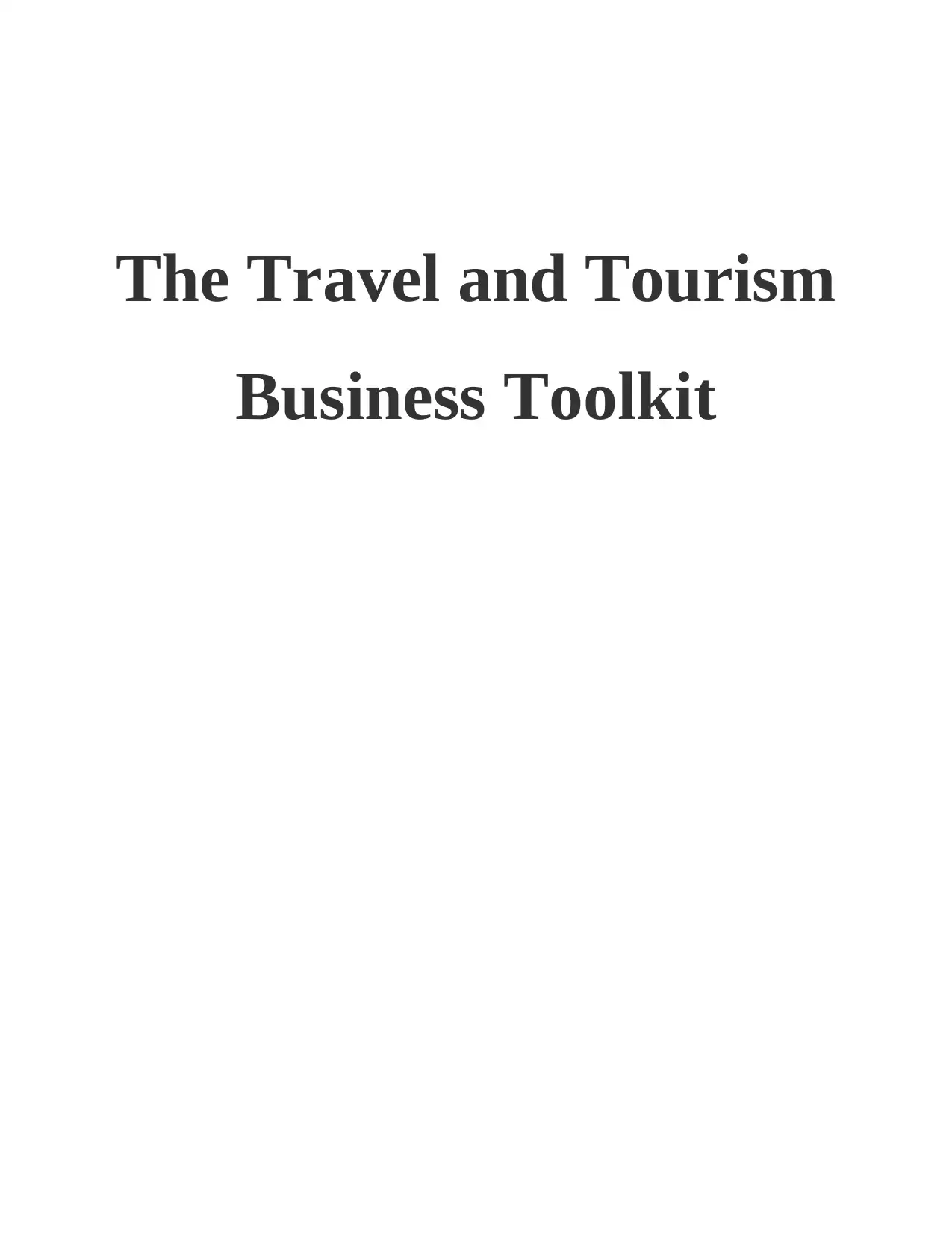
The Travel and Tourism
Business Toolkit
Business Toolkit
Paraphrase This Document
Need a fresh take? Get an instant paraphrase of this document with our AI Paraphraser
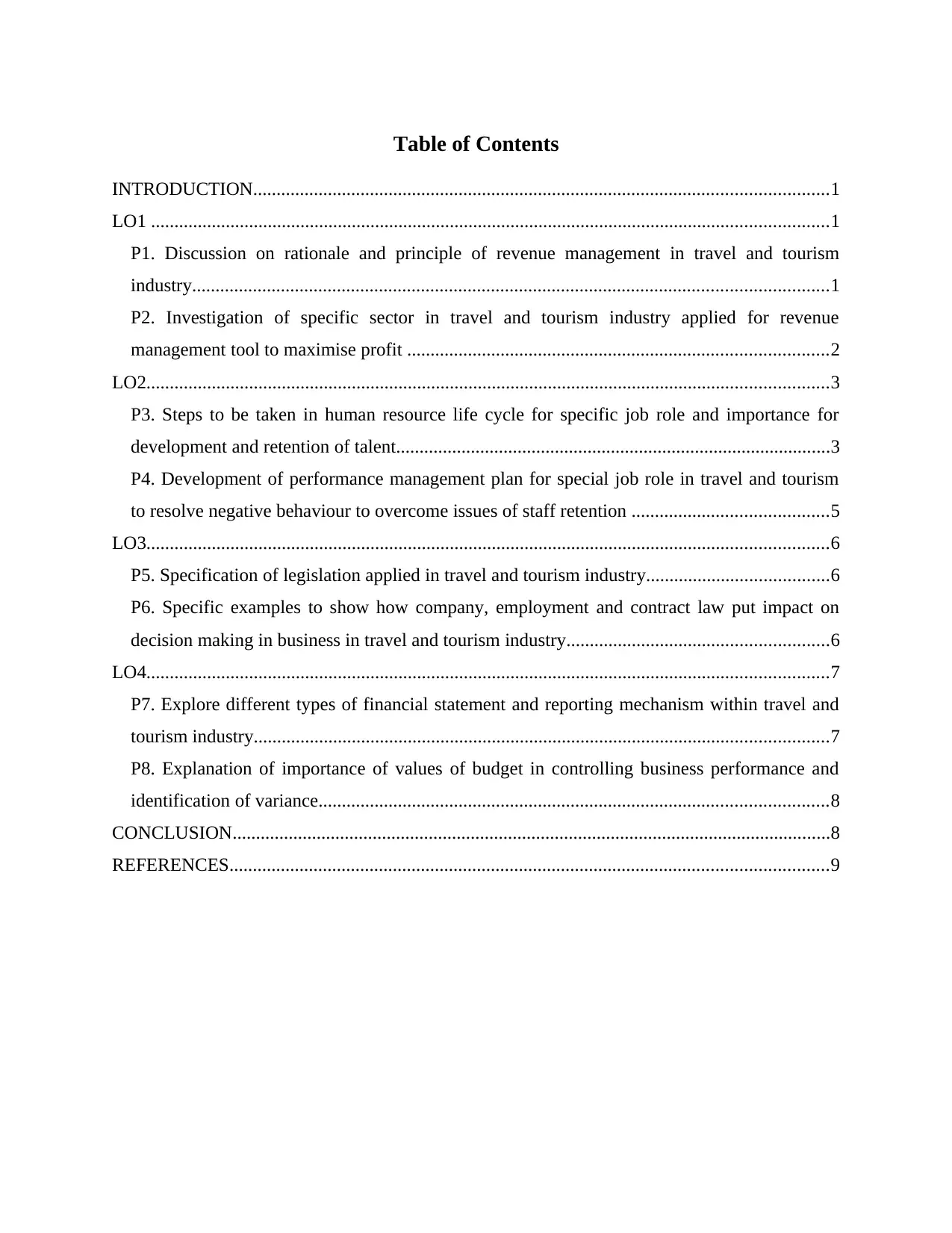
Table of Contents
INTRODUCTION...........................................................................................................................1
LO1 .................................................................................................................................................1
P1. Discussion on rationale and principle of revenue management in travel and tourism
industry........................................................................................................................................1
P2. Investigation of specific sector in travel and tourism industry applied for revenue
management tool to maximise profit ..........................................................................................2
LO2..................................................................................................................................................3
P3. Steps to be taken in human resource life cycle for specific job role and importance for
development and retention of talent.............................................................................................3
P4. Development of performance management plan for special job role in travel and tourism
to resolve negative behaviour to overcome issues of staff retention ..........................................5
LO3..................................................................................................................................................6
P5. Specification of legislation applied in travel and tourism industry.......................................6
P6. Specific examples to show how company, employment and contract law put impact on
decision making in business in travel and tourism industry........................................................6
LO4..................................................................................................................................................7
P7. Explore different types of financial statement and reporting mechanism within travel and
tourism industry...........................................................................................................................7
P8. Explanation of importance of values of budget in controlling business performance and
identification of variance.............................................................................................................8
CONCLUSION................................................................................................................................8
REFERENCES................................................................................................................................9
INTRODUCTION...........................................................................................................................1
LO1 .................................................................................................................................................1
P1. Discussion on rationale and principle of revenue management in travel and tourism
industry........................................................................................................................................1
P2. Investigation of specific sector in travel and tourism industry applied for revenue
management tool to maximise profit ..........................................................................................2
LO2..................................................................................................................................................3
P3. Steps to be taken in human resource life cycle for specific job role and importance for
development and retention of talent.............................................................................................3
P4. Development of performance management plan for special job role in travel and tourism
to resolve negative behaviour to overcome issues of staff retention ..........................................5
LO3..................................................................................................................................................6
P5. Specification of legislation applied in travel and tourism industry.......................................6
P6. Specific examples to show how company, employment and contract law put impact on
decision making in business in travel and tourism industry........................................................6
LO4..................................................................................................................................................7
P7. Explore different types of financial statement and reporting mechanism within travel and
tourism industry...........................................................................................................................7
P8. Explanation of importance of values of budget in controlling business performance and
identification of variance.............................................................................................................8
CONCLUSION................................................................................................................................8
REFERENCES................................................................................................................................9
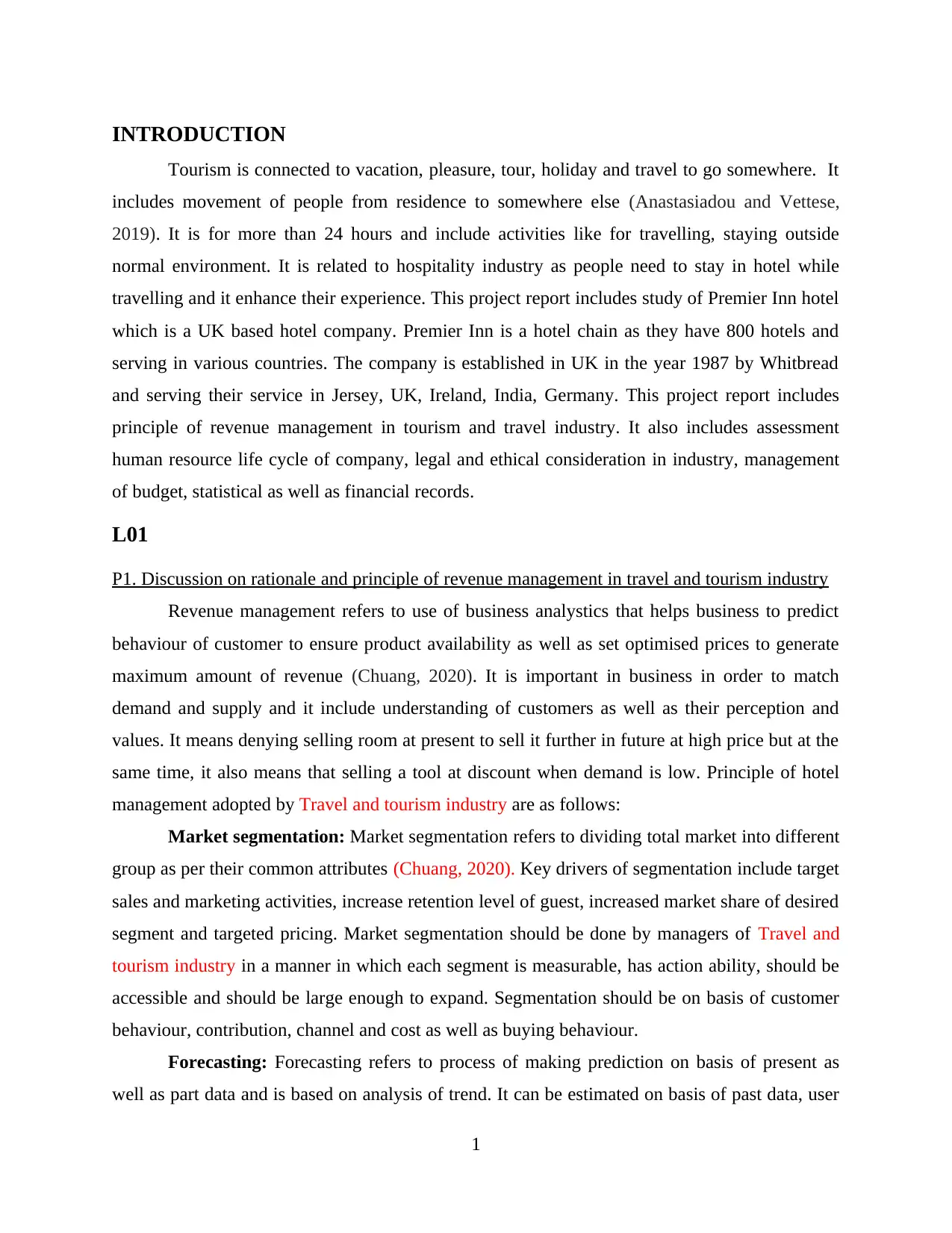
INTRODUCTION
Tourism is connected to vacation, pleasure, tour, holiday and travel to go somewhere. It
includes movement of people from residence to somewhere else (Anastasiadou and Vettese,
2019). It is for more than 24 hours and include activities like for travelling, staying outside
normal environment. It is related to hospitality industry as people need to stay in hotel while
travelling and it enhance their experience. This project report includes study of Premier Inn hotel
which is a UK based hotel company. Premier Inn is a hotel chain as they have 800 hotels and
serving in various countries. The company is established in UK in the year 1987 by Whitbread
and serving their service in Jersey, UK, Ireland, India, Germany. This project report includes
principle of revenue management in tourism and travel industry. It also includes assessment
human resource life cycle of company, legal and ethical consideration in industry, management
of budget, statistical as well as financial records.
L01
P1. Discussion on rationale and principle of revenue management in travel and tourism industry
Revenue management refers to use of business analystics that helps business to predict
behaviour of customer to ensure product availability as well as set optimised prices to generate
maximum amount of revenue (Chuang, 2020). It is important in business in order to match
demand and supply and it include understanding of customers as well as their perception and
values. It means denying selling room at present to sell it further in future at high price but at the
same time, it also means that selling a tool at discount when demand is low. Principle of hotel
management adopted by Travel and tourism industry are as follows:
Market segmentation: Market segmentation refers to dividing total market into different
group as per their common attributes (Chuang, 2020). Key drivers of segmentation include target
sales and marketing activities, increase retention level of guest, increased market share of desired
segment and targeted pricing. Market segmentation should be done by managers of Travel and
tourism industry in a manner in which each segment is measurable, has action ability, should be
accessible and should be large enough to expand. Segmentation should be on basis of customer
behaviour, contribution, channel and cost as well as buying behaviour.
Forecasting: Forecasting refers to process of making prediction on basis of present as
well as part data and is based on analysis of trend. It can be estimated on basis of past data, user
1
Tourism is connected to vacation, pleasure, tour, holiday and travel to go somewhere. It
includes movement of people from residence to somewhere else (Anastasiadou and Vettese,
2019). It is for more than 24 hours and include activities like for travelling, staying outside
normal environment. It is related to hospitality industry as people need to stay in hotel while
travelling and it enhance their experience. This project report includes study of Premier Inn hotel
which is a UK based hotel company. Premier Inn is a hotel chain as they have 800 hotels and
serving in various countries. The company is established in UK in the year 1987 by Whitbread
and serving their service in Jersey, UK, Ireland, India, Germany. This project report includes
principle of revenue management in tourism and travel industry. It also includes assessment
human resource life cycle of company, legal and ethical consideration in industry, management
of budget, statistical as well as financial records.
L01
P1. Discussion on rationale and principle of revenue management in travel and tourism industry
Revenue management refers to use of business analystics that helps business to predict
behaviour of customer to ensure product availability as well as set optimised prices to generate
maximum amount of revenue (Chuang, 2020). It is important in business in order to match
demand and supply and it include understanding of customers as well as their perception and
values. It means denying selling room at present to sell it further in future at high price but at the
same time, it also means that selling a tool at discount when demand is low. Principle of hotel
management adopted by Travel and tourism industry are as follows:
Market segmentation: Market segmentation refers to dividing total market into different
group as per their common attributes (Chuang, 2020). Key drivers of segmentation include target
sales and marketing activities, increase retention level of guest, increased market share of desired
segment and targeted pricing. Market segmentation should be done by managers of Travel and
tourism industry in a manner in which each segment is measurable, has action ability, should be
accessible and should be large enough to expand. Segmentation should be on basis of customer
behaviour, contribution, channel and cost as well as buying behaviour.
Forecasting: Forecasting refers to process of making prediction on basis of present as
well as part data and is based on analysis of trend. It can be estimated on basis of past data, user
1
⊘ This is a preview!⊘
Do you want full access?
Subscribe today to unlock all pages.

Trusted by 1+ million students worldwide
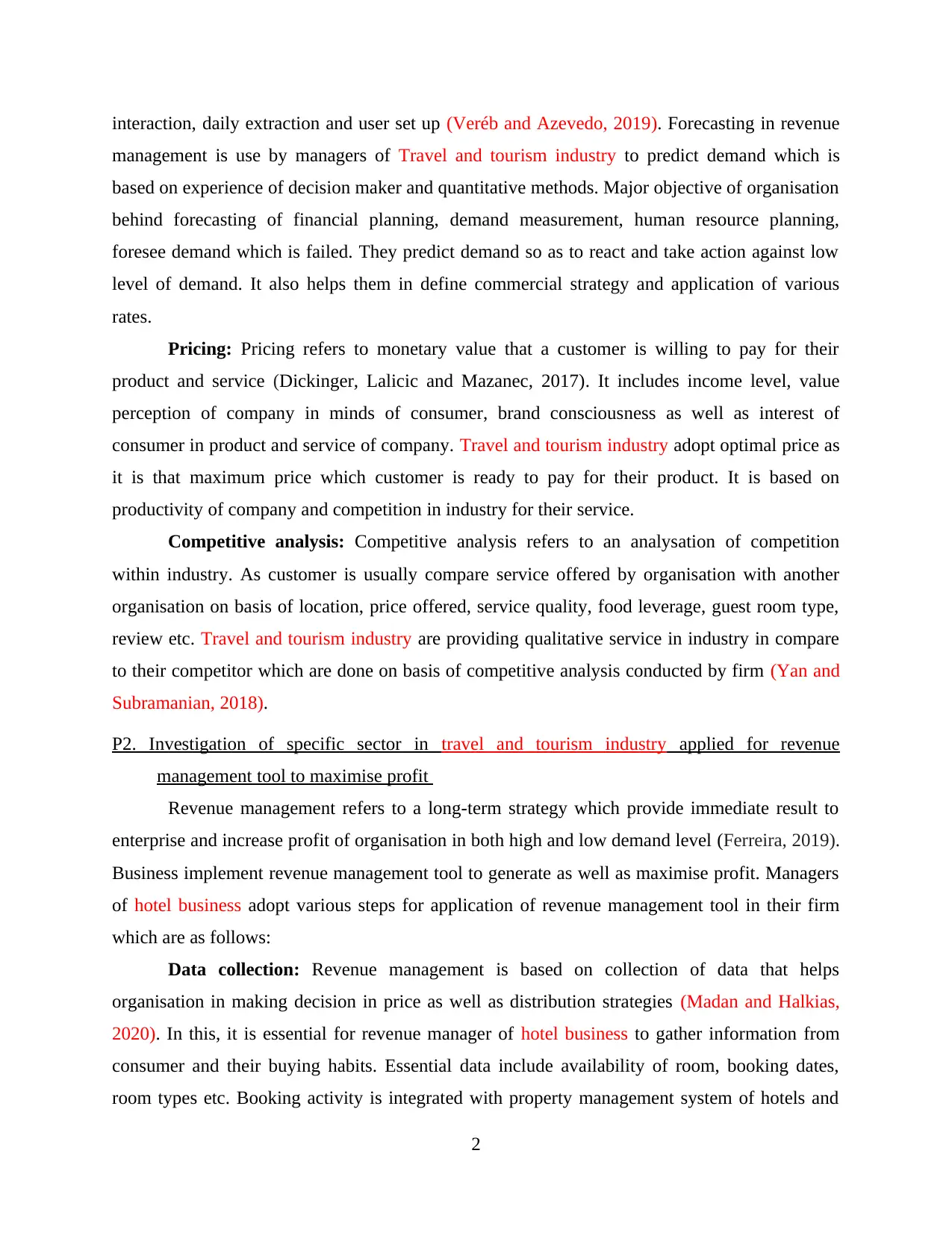
interaction, daily extraction and user set up (Veréb and Azevedo, 2019). Forecasting in revenue
management is use by managers of Travel and tourism industry to predict demand which is
based on experience of decision maker and quantitative methods. Major objective of organisation
behind forecasting of financial planning, demand measurement, human resource planning,
foresee demand which is failed. They predict demand so as to react and take action against low
level of demand. It also helps them in define commercial strategy and application of various
rates.
Pricing: Pricing refers to monetary value that a customer is willing to pay for their
product and service (Dickinger, Lalicic and Mazanec, 2017). It includes income level, value
perception of company in minds of consumer, brand consciousness as well as interest of
consumer in product and service of company. Travel and tourism industry adopt optimal price as
it is that maximum price which customer is ready to pay for their product. It is based on
productivity of company and competition in industry for their service.
Competitive analysis: Competitive analysis refers to an analysation of competition
within industry. As customer is usually compare service offered by organisation with another
organisation on basis of location, price offered, service quality, food leverage, guest room type,
review etc. Travel and tourism industry are providing qualitative service in industry in compare
to their competitor which are done on basis of competitive analysis conducted by firm (Yan and
Subramanian, 2018).
P2. Investigation of specific sector in travel and tourism industry applied for revenue
management tool to maximise profit
Revenue management refers to a long-term strategy which provide immediate result to
enterprise and increase profit of organisation in both high and low demand level (Ferreira, 2019).
Business implement revenue management tool to generate as well as maximise profit. Managers
of hotel business adopt various steps for application of revenue management tool in their firm
which are as follows:
Data collection: Revenue management is based on collection of data that helps
organisation in making decision in price as well as distribution strategies (Madan and Halkias,
2020). In this, it is essential for revenue manager of hotel business to gather information from
consumer and their buying habits. Essential data include availability of room, booking dates,
room types etc. Booking activity is integrated with property management system of hotels and
2
management is use by managers of Travel and tourism industry to predict demand which is
based on experience of decision maker and quantitative methods. Major objective of organisation
behind forecasting of financial planning, demand measurement, human resource planning,
foresee demand which is failed. They predict demand so as to react and take action against low
level of demand. It also helps them in define commercial strategy and application of various
rates.
Pricing: Pricing refers to monetary value that a customer is willing to pay for their
product and service (Dickinger, Lalicic and Mazanec, 2017). It includes income level, value
perception of company in minds of consumer, brand consciousness as well as interest of
consumer in product and service of company. Travel and tourism industry adopt optimal price as
it is that maximum price which customer is ready to pay for their product. It is based on
productivity of company and competition in industry for their service.
Competitive analysis: Competitive analysis refers to an analysation of competition
within industry. As customer is usually compare service offered by organisation with another
organisation on basis of location, price offered, service quality, food leverage, guest room type,
review etc. Travel and tourism industry are providing qualitative service in industry in compare
to their competitor which are done on basis of competitive analysis conducted by firm (Yan and
Subramanian, 2018).
P2. Investigation of specific sector in travel and tourism industry applied for revenue
management tool to maximise profit
Revenue management refers to a long-term strategy which provide immediate result to
enterprise and increase profit of organisation in both high and low demand level (Ferreira, 2019).
Business implement revenue management tool to generate as well as maximise profit. Managers
of hotel business adopt various steps for application of revenue management tool in their firm
which are as follows:
Data collection: Revenue management is based on collection of data that helps
organisation in making decision in price as well as distribution strategies (Madan and Halkias,
2020). In this, it is essential for revenue manager of hotel business to gather information from
consumer and their buying habits. Essential data include availability of room, booking dates,
room types etc. Booking activity is integrated with property management system of hotels and
2
Paraphrase This Document
Need a fresh take? Get an instant paraphrase of this document with our AI Paraphraser
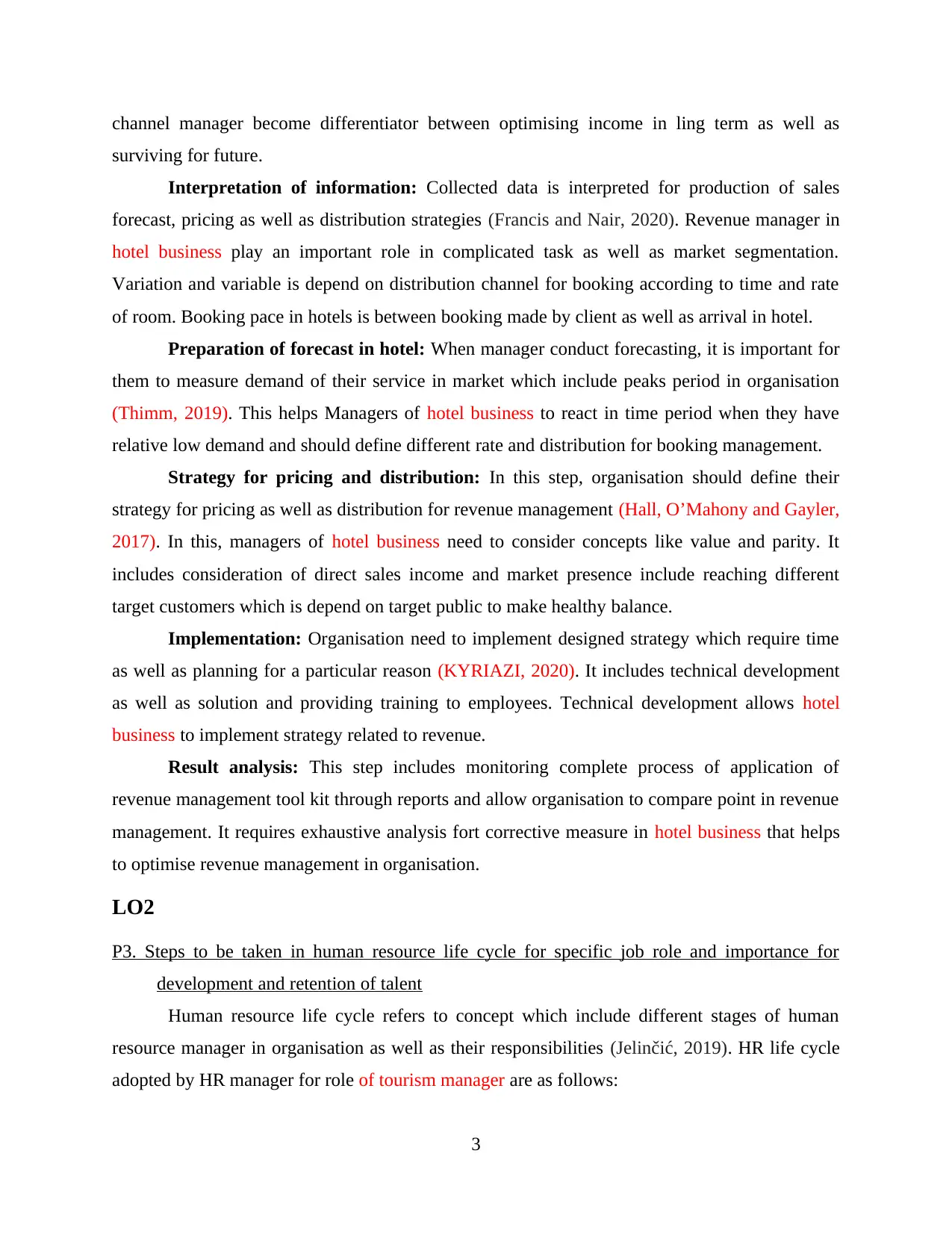
channel manager become differentiator between optimising income in ling term as well as
surviving for future.
Interpretation of information: Collected data is interpreted for production of sales
forecast, pricing as well as distribution strategies (Francis and Nair, 2020). Revenue manager in
hotel business play an important role in complicated task as well as market segmentation.
Variation and variable is depend on distribution channel for booking according to time and rate
of room. Booking pace in hotels is between booking made by client as well as arrival in hotel.
Preparation of forecast in hotel: When manager conduct forecasting, it is important for
them to measure demand of their service in market which include peaks period in organisation
(Thimm, 2019). This helps Managers of hotel business to react in time period when they have
relative low demand and should define different rate and distribution for booking management.
Strategy for pricing and distribution: In this step, organisation should define their
strategy for pricing as well as distribution for revenue management (Hall, O’Mahony and Gayler,
2017). In this, managers of hotel business need to consider concepts like value and parity. It
includes consideration of direct sales income and market presence include reaching different
target customers which is depend on target public to make healthy balance.
Implementation: Organisation need to implement designed strategy which require time
as well as planning for a particular reason (KYRIAZI, 2020). It includes technical development
as well as solution and providing training to employees. Technical development allows hotel
business to implement strategy related to revenue.
Result analysis: This step includes monitoring complete process of application of
revenue management tool kit through reports and allow organisation to compare point in revenue
management. It requires exhaustive analysis fort corrective measure in hotel business that helps
to optimise revenue management in organisation.
LO2
P3. Steps to be taken in human resource life cycle for specific job role and importance for
development and retention of talent
Human resource life cycle refers to concept which include different stages of human
resource manager in organisation as well as their responsibilities (Jelinčić, 2019). HR life cycle
adopted by HR manager for role of tourism manager are as follows:
3
surviving for future.
Interpretation of information: Collected data is interpreted for production of sales
forecast, pricing as well as distribution strategies (Francis and Nair, 2020). Revenue manager in
hotel business play an important role in complicated task as well as market segmentation.
Variation and variable is depend on distribution channel for booking according to time and rate
of room. Booking pace in hotels is between booking made by client as well as arrival in hotel.
Preparation of forecast in hotel: When manager conduct forecasting, it is important for
them to measure demand of their service in market which include peaks period in organisation
(Thimm, 2019). This helps Managers of hotel business to react in time period when they have
relative low demand and should define different rate and distribution for booking management.
Strategy for pricing and distribution: In this step, organisation should define their
strategy for pricing as well as distribution for revenue management (Hall, O’Mahony and Gayler,
2017). In this, managers of hotel business need to consider concepts like value and parity. It
includes consideration of direct sales income and market presence include reaching different
target customers which is depend on target public to make healthy balance.
Implementation: Organisation need to implement designed strategy which require time
as well as planning for a particular reason (KYRIAZI, 2020). It includes technical development
as well as solution and providing training to employees. Technical development allows hotel
business to implement strategy related to revenue.
Result analysis: This step includes monitoring complete process of application of
revenue management tool kit through reports and allow organisation to compare point in revenue
management. It requires exhaustive analysis fort corrective measure in hotel business that helps
to optimise revenue management in organisation.
LO2
P3. Steps to be taken in human resource life cycle for specific job role and importance for
development and retention of talent
Human resource life cycle refers to concept which include different stages of human
resource manager in organisation as well as their responsibilities (Jelinčić, 2019). HR life cycle
adopted by HR manager for role of tourism manager are as follows:
3
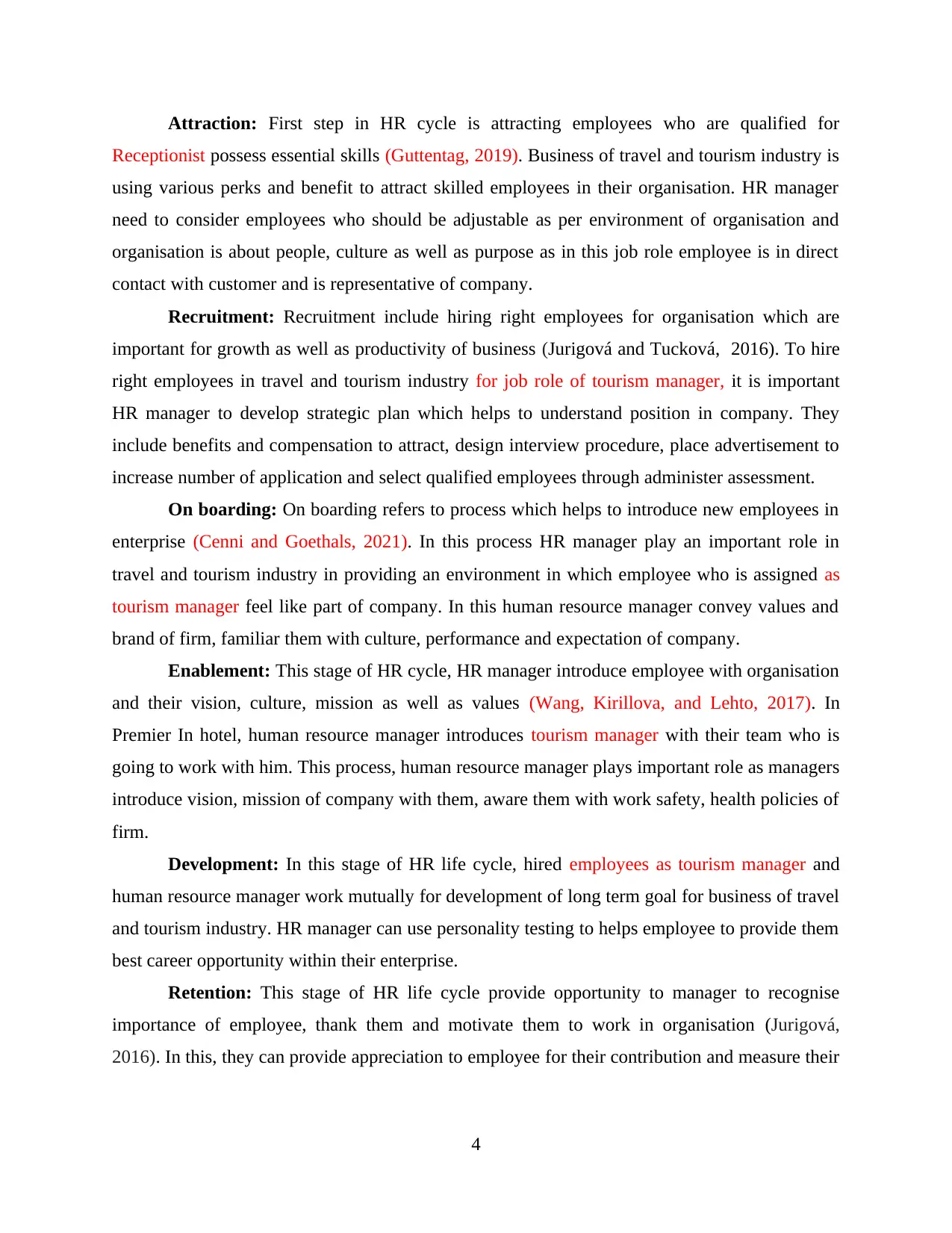
Attraction: First step in HR cycle is attracting employees who are qualified for
Receptionist possess essential skills (Guttentag, 2019). Business of travel and tourism industry is
using various perks and benefit to attract skilled employees in their organisation. HR manager
need to consider employees who should be adjustable as per environment of organisation and
organisation is about people, culture as well as purpose as in this job role employee is in direct
contact with customer and is representative of company.
Recruitment: Recruitment include hiring right employees for organisation which are
important for growth as well as productivity of business (Jurigová and Tucková, 2016). To hire
right employees in travel and tourism industry for job role of tourism manager, it is important
HR manager to develop strategic plan which helps to understand position in company. They
include benefits and compensation to attract, design interview procedure, place advertisement to
increase number of application and select qualified employees through administer assessment.
On boarding: On boarding refers to process which helps to introduce new employees in
enterprise (Cenni and Goethals, 2021). In this process HR manager play an important role in
travel and tourism industry in providing an environment in which employee who is assigned as
tourism manager feel like part of company. In this human resource manager convey values and
brand of firm, familiar them with culture, performance and expectation of company.
Enablement: This stage of HR cycle, HR manager introduce employee with organisation
and their vision, culture, mission as well as values (Wang, Kirillova, and Lehto, 2017). In
Premier In hotel, human resource manager introduces tourism manager with their team who is
going to work with him. This process, human resource manager plays important role as managers
introduce vision, mission of company with them, aware them with work safety, health policies of
firm.
Development: In this stage of HR life cycle, hired employees as tourism manager and
human resource manager work mutually for development of long term goal for business of travel
and tourism industry. HR manager can use personality testing to helps employee to provide them
best career opportunity within their enterprise.
Retention: This stage of HR life cycle provide opportunity to manager to recognise
importance of employee, thank them and motivate them to work in organisation (Jurigová,
2016). In this, they can provide appreciation to employee for their contribution and measure their
4
Receptionist possess essential skills (Guttentag, 2019). Business of travel and tourism industry is
using various perks and benefit to attract skilled employees in their organisation. HR manager
need to consider employees who should be adjustable as per environment of organisation and
organisation is about people, culture as well as purpose as in this job role employee is in direct
contact with customer and is representative of company.
Recruitment: Recruitment include hiring right employees for organisation which are
important for growth as well as productivity of business (Jurigová and Tucková, 2016). To hire
right employees in travel and tourism industry for job role of tourism manager, it is important
HR manager to develop strategic plan which helps to understand position in company. They
include benefits and compensation to attract, design interview procedure, place advertisement to
increase number of application and select qualified employees through administer assessment.
On boarding: On boarding refers to process which helps to introduce new employees in
enterprise (Cenni and Goethals, 2021). In this process HR manager play an important role in
travel and tourism industry in providing an environment in which employee who is assigned as
tourism manager feel like part of company. In this human resource manager convey values and
brand of firm, familiar them with culture, performance and expectation of company.
Enablement: This stage of HR cycle, HR manager introduce employee with organisation
and their vision, culture, mission as well as values (Wang, Kirillova, and Lehto, 2017). In
Premier In hotel, human resource manager introduces tourism manager with their team who is
going to work with him. This process, human resource manager plays important role as managers
introduce vision, mission of company with them, aware them with work safety, health policies of
firm.
Development: In this stage of HR life cycle, hired employees as tourism manager and
human resource manager work mutually for development of long term goal for business of travel
and tourism industry. HR manager can use personality testing to helps employee to provide them
best career opportunity within their enterprise.
Retention: This stage of HR life cycle provide opportunity to manager to recognise
importance of employee, thank them and motivate them to work in organisation (Jurigová,
2016). In this, they can provide appreciation to employee for their contribution and measure their
4
⊘ This is a preview!⊘
Do you want full access?
Subscribe today to unlock all pages.

Trusted by 1+ million students worldwide
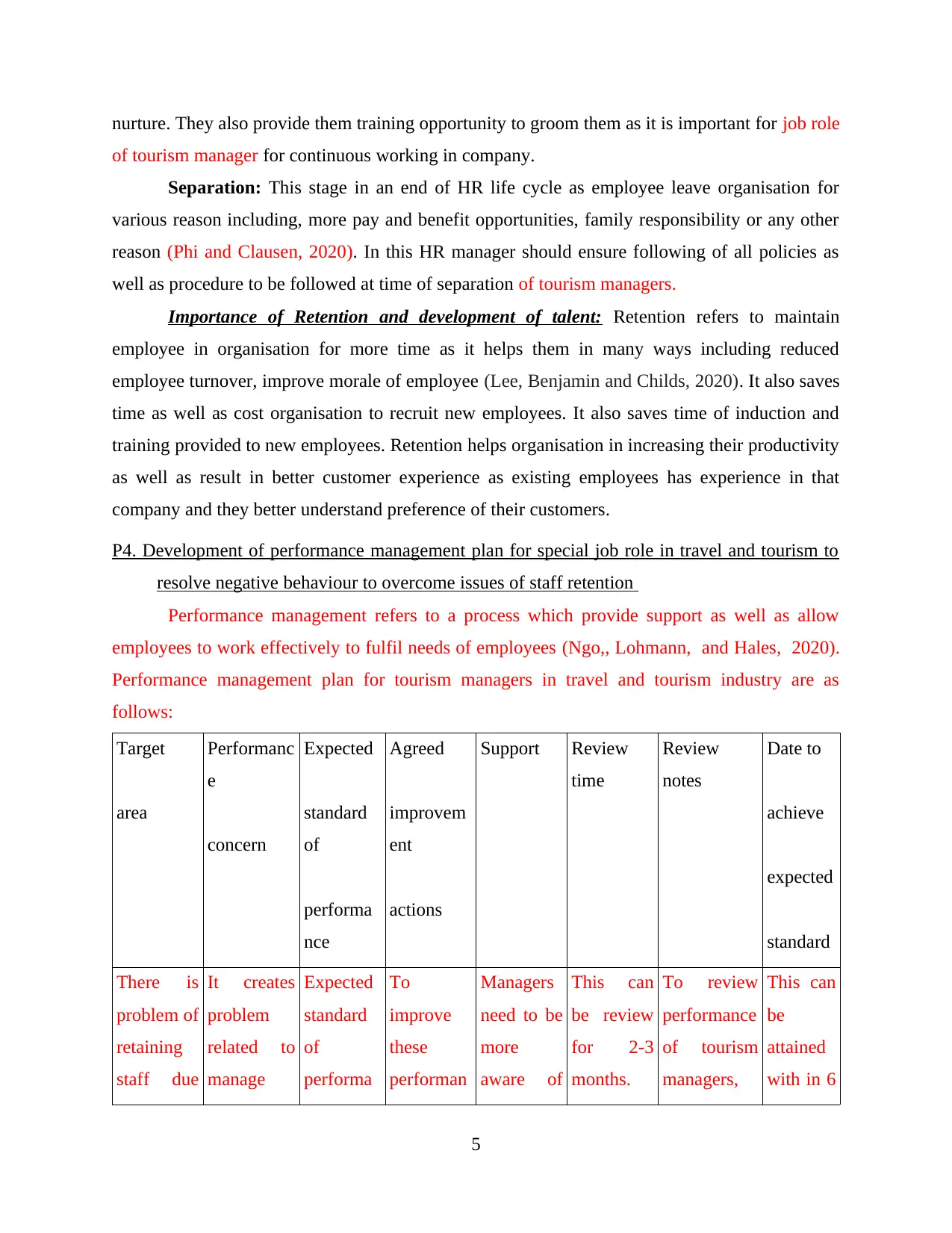
nurture. They also provide them training opportunity to groom them as it is important for job role
of tourism manager for continuous working in company.
Separation: This stage in an end of HR life cycle as employee leave organisation for
various reason including, more pay and benefit opportunities, family responsibility or any other
reason (Phi and Clausen, 2020). In this HR manager should ensure following of all policies as
well as procedure to be followed at time of separation of tourism managers.
Importance of Retention and development of talent: Retention refers to maintain
employee in organisation for more time as it helps them in many ways including reduced
employee turnover, improve morale of employee (Lee, Benjamin and Childs, 2020). It also saves
time as well as cost organisation to recruit new employees. It also saves time of induction and
training provided to new employees. Retention helps organisation in increasing their productivity
as well as result in better customer experience as existing employees has experience in that
company and they better understand preference of their customers.
P4. Development of performance management plan for special job role in travel and tourism to
resolve negative behaviour to overcome issues of staff retention
Performance management refers to a process which provide support as well as allow
employees to work effectively to fulfil needs of employees (Ngo,, Lohmann, and Hales, 2020).
Performance management plan for tourism managers in travel and tourism industry are as
follows:
Target
area
Performanc
e
concern
Expected
standard
of
performa
nce
Agreed
improvem
ent
actions
Support Review
time
Review
notes
Date to
achieve
expected
standard
There is
problem of
retaining
staff due
It creates
problem
related to
manage
Expected
standard
of
performa
To
improve
these
performan
Managers
need to be
more
aware of
This can
be review
for 2-3
months.
To review
performance
of tourism
managers,
This can
be
attained
with in 6
5
of tourism manager for continuous working in company.
Separation: This stage in an end of HR life cycle as employee leave organisation for
various reason including, more pay and benefit opportunities, family responsibility or any other
reason (Phi and Clausen, 2020). In this HR manager should ensure following of all policies as
well as procedure to be followed at time of separation of tourism managers.
Importance of Retention and development of talent: Retention refers to maintain
employee in organisation for more time as it helps them in many ways including reduced
employee turnover, improve morale of employee (Lee, Benjamin and Childs, 2020). It also saves
time as well as cost organisation to recruit new employees. It also saves time of induction and
training provided to new employees. Retention helps organisation in increasing their productivity
as well as result in better customer experience as existing employees has experience in that
company and they better understand preference of their customers.
P4. Development of performance management plan for special job role in travel and tourism to
resolve negative behaviour to overcome issues of staff retention
Performance management refers to a process which provide support as well as allow
employees to work effectively to fulfil needs of employees (Ngo,, Lohmann, and Hales, 2020).
Performance management plan for tourism managers in travel and tourism industry are as
follows:
Target
area
Performanc
e
concern
Expected
standard
of
performa
nce
Agreed
improvem
ent
actions
Support Review
time
Review
notes
Date to
achieve
expected
standard
There is
problem of
retaining
staff due
It creates
problem
related to
manage
Expected
standard
of
performa
To
improve
these
performan
Managers
need to be
more
aware of
This can
be review
for 2-3
months.
To review
performance
of tourism
managers,
This can
be
attained
with in 6
5
Paraphrase This Document
Need a fresh take? Get an instant paraphrase of this document with our AI Paraphraser
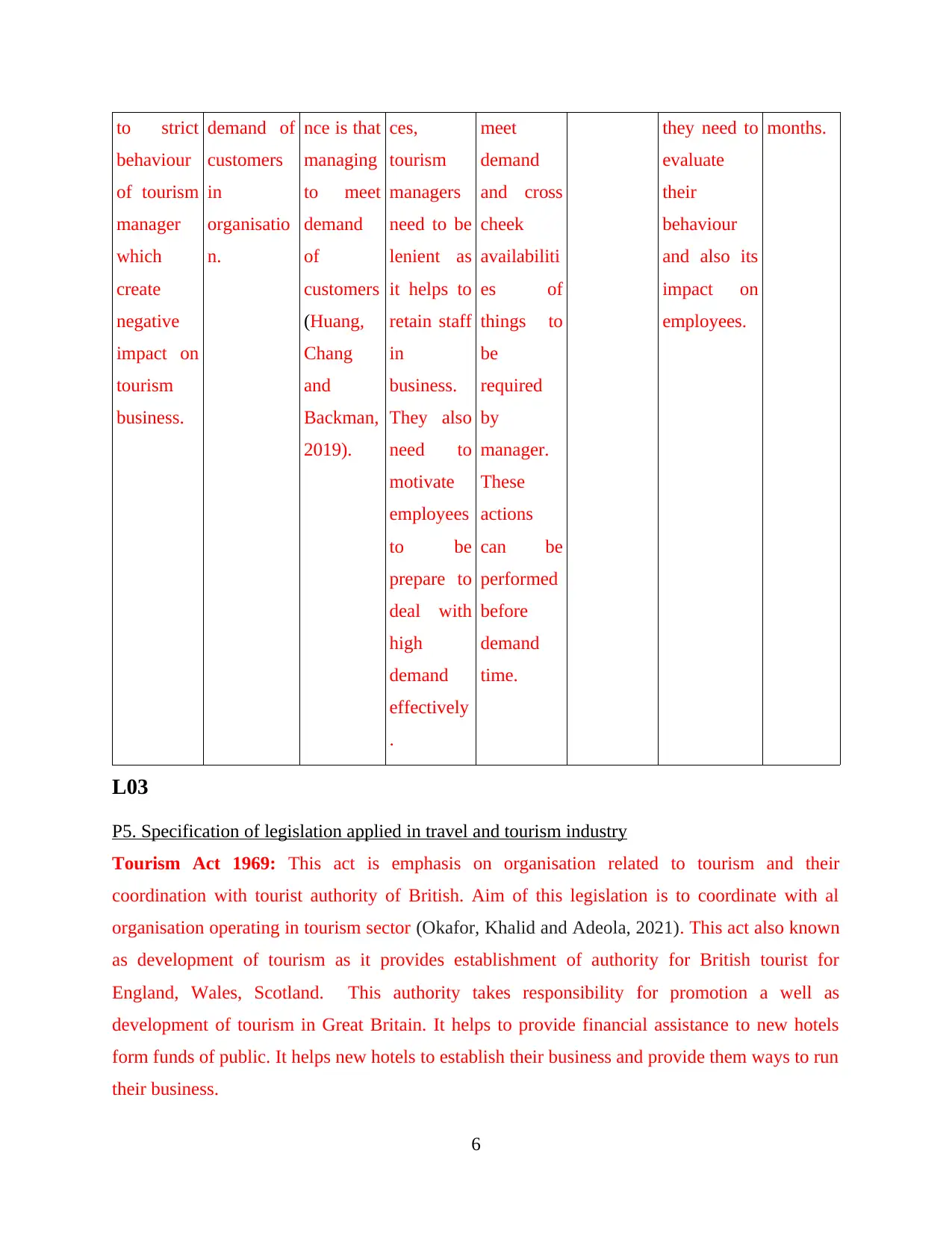
to strict
behaviour
of tourism
manager
which
create
negative
impact on
tourism
business.
demand of
customers
in
organisatio
n.
nce is that
managing
to meet
demand
of
customers
(Huang,
Chang
and
Backman,
2019).
ces,
tourism
managers
need to be
lenient as
it helps to
retain staff
in
business.
They also
need to
motivate
employees
to be
prepare to
deal with
high
demand
effectively
.
meet
demand
and cross
cheek
availabiliti
es of
things to
be
required
by
manager.
These
actions
can be
performed
before
demand
time.
they need to
evaluate
their
behaviour
and also its
impact on
employees.
months.
L03
P5. Specification of legislation applied in travel and tourism industry
Tourism Act 1969: This act is emphasis on organisation related to tourism and their
coordination with tourist authority of British. Aim of this legislation is to coordinate with al
organisation operating in tourism sector (Okafor, Khalid and Adeola, 2021). This act also known
as development of tourism as it provides establishment of authority for British tourist for
England, Wales, Scotland. This authority takes responsibility for promotion a well as
development of tourism in Great Britain. It helps to provide financial assistance to new hotels
form funds of public. It helps new hotels to establish their business and provide them ways to run
their business.
6
behaviour
of tourism
manager
which
create
negative
impact on
tourism
business.
demand of
customers
in
organisatio
n.
nce is that
managing
to meet
demand
of
customers
(Huang,
Chang
and
Backman,
2019).
ces,
tourism
managers
need to be
lenient as
it helps to
retain staff
in
business.
They also
need to
motivate
employees
to be
prepare to
deal with
high
demand
effectively
.
meet
demand
and cross
cheek
availabiliti
es of
things to
be
required
by
manager.
These
actions
can be
performed
before
demand
time.
they need to
evaluate
their
behaviour
and also its
impact on
employees.
months.
L03
P5. Specification of legislation applied in travel and tourism industry
Tourism Act 1969: This act is emphasis on organisation related to tourism and their
coordination with tourist authority of British. Aim of this legislation is to coordinate with al
organisation operating in tourism sector (Okafor, Khalid and Adeola, 2021). This act also known
as development of tourism as it provides establishment of authority for British tourist for
England, Wales, Scotland. This authority takes responsibility for promotion a well as
development of tourism in Great Britain. It helps to provide financial assistance to new hotels
form funds of public. It helps new hotels to establish their business and provide them ways to run
their business.
6
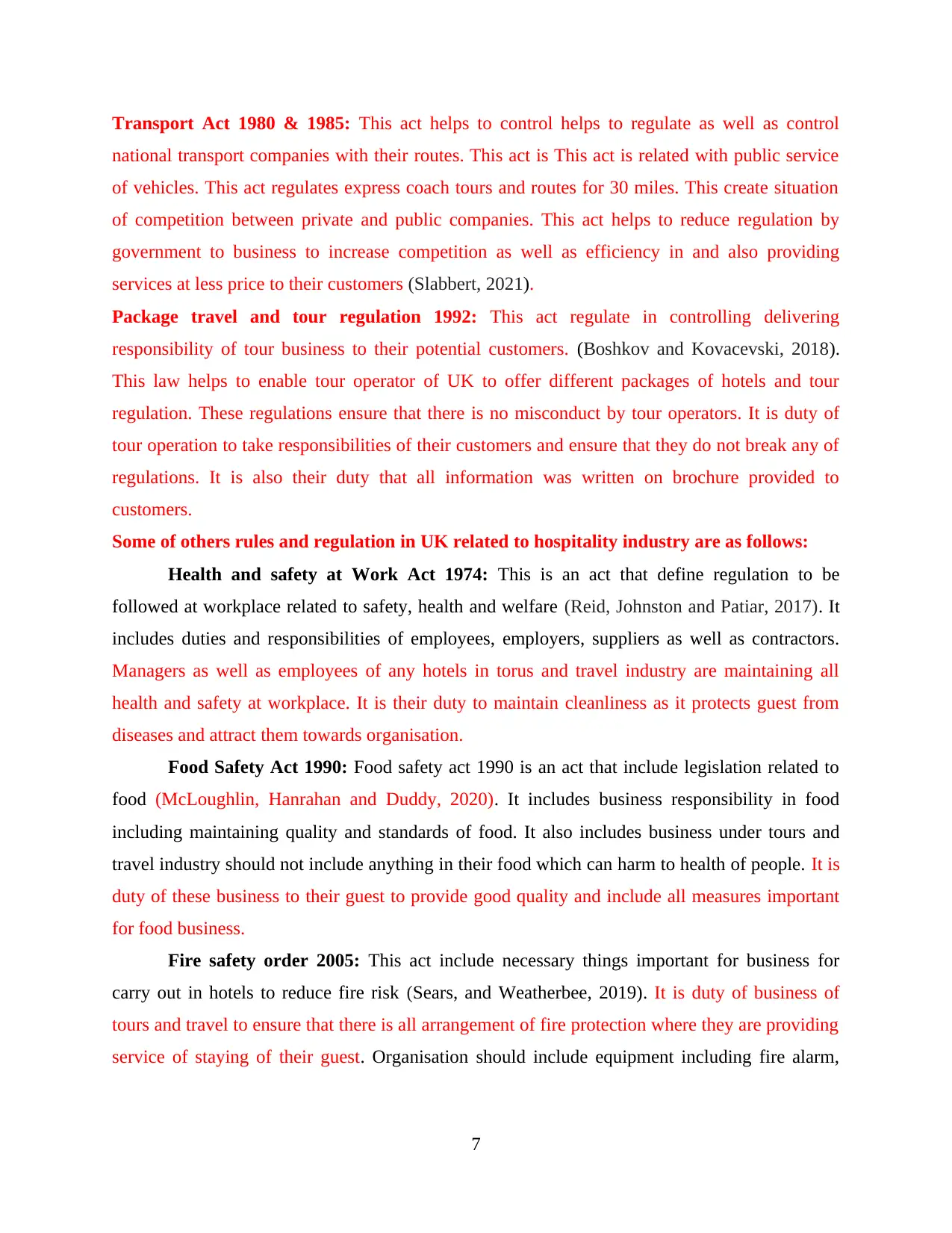
Transport Act 1980 & 1985: This act helps to control helps to regulate as well as control
national transport companies with their routes. This act is This act is related with public service
of vehicles. This act regulates express coach tours and routes for 30 miles. This create situation
of competition between private and public companies. This act helps to reduce regulation by
government to business to increase competition as well as efficiency in and also providing
services at less price to their customers (Slabbert, 2021).
Package travel and tour regulation 1992: This act regulate in controlling delivering
responsibility of tour business to their potential customers. (Boshkov and Kovacevski, 2018).
This law helps to enable tour operator of UK to offer different packages of hotels and tour
regulation. These regulations ensure that there is no misconduct by tour operators. It is duty of
tour operation to take responsibilities of their customers and ensure that they do not break any of
regulations. It is also their duty that all information was written on brochure provided to
customers.
Some of others rules and regulation in UK related to hospitality industry are as follows:
Health and safety at Work Act 1974: This is an act that define regulation to be
followed at workplace related to safety, health and welfare (Reid, Johnston and Patiar, 2017). It
includes duties and responsibilities of employees, employers, suppliers as well as contractors.
Managers as well as employees of any hotels in torus and travel industry are maintaining all
health and safety at workplace. It is their duty to maintain cleanliness as it protects guest from
diseases and attract them towards organisation.
Food Safety Act 1990: Food safety act 1990 is an act that include legislation related to
food (McLoughlin, Hanrahan and Duddy, 2020). It includes business responsibility in food
including maintaining quality and standards of food. It also includes business under tours and
travel industry should not include anything in their food which can harm to health of people. It is
duty of these business to their guest to provide good quality and include all measures important
for food business.
Fire safety order 2005: This act include necessary things important for business for
carry out in hotels to reduce fire risk (Sears, and Weatherbee, 2019). It is duty of business of
tours and travel to ensure that there is all arrangement of fire protection where they are providing
service of staying of their guest. Organisation should include equipment including fire alarm,
7
national transport companies with their routes. This act is This act is related with public service
of vehicles. This act regulates express coach tours and routes for 30 miles. This create situation
of competition between private and public companies. This act helps to reduce regulation by
government to business to increase competition as well as efficiency in and also providing
services at less price to their customers (Slabbert, 2021).
Package travel and tour regulation 1992: This act regulate in controlling delivering
responsibility of tour business to their potential customers. (Boshkov and Kovacevski, 2018).
This law helps to enable tour operator of UK to offer different packages of hotels and tour
regulation. These regulations ensure that there is no misconduct by tour operators. It is duty of
tour operation to take responsibilities of their customers and ensure that they do not break any of
regulations. It is also their duty that all information was written on brochure provided to
customers.
Some of others rules and regulation in UK related to hospitality industry are as follows:
Health and safety at Work Act 1974: This is an act that define regulation to be
followed at workplace related to safety, health and welfare (Reid, Johnston and Patiar, 2017). It
includes duties and responsibilities of employees, employers, suppliers as well as contractors.
Managers as well as employees of any hotels in torus and travel industry are maintaining all
health and safety at workplace. It is their duty to maintain cleanliness as it protects guest from
diseases and attract them towards organisation.
Food Safety Act 1990: Food safety act 1990 is an act that include legislation related to
food (McLoughlin, Hanrahan and Duddy, 2020). It includes business responsibility in food
including maintaining quality and standards of food. It also includes business under tours and
travel industry should not include anything in their food which can harm to health of people. It is
duty of these business to their guest to provide good quality and include all measures important
for food business.
Fire safety order 2005: This act include necessary things important for business for
carry out in hotels to reduce fire risk (Sears, and Weatherbee, 2019). It is duty of business of
tours and travel to ensure that there is all arrangement of fire protection where they are providing
service of staying of their guest. Organisation should include equipment including fire alarm,
7
⊘ This is a preview!⊘
Do you want full access?
Subscribe today to unlock all pages.

Trusted by 1+ million students worldwide
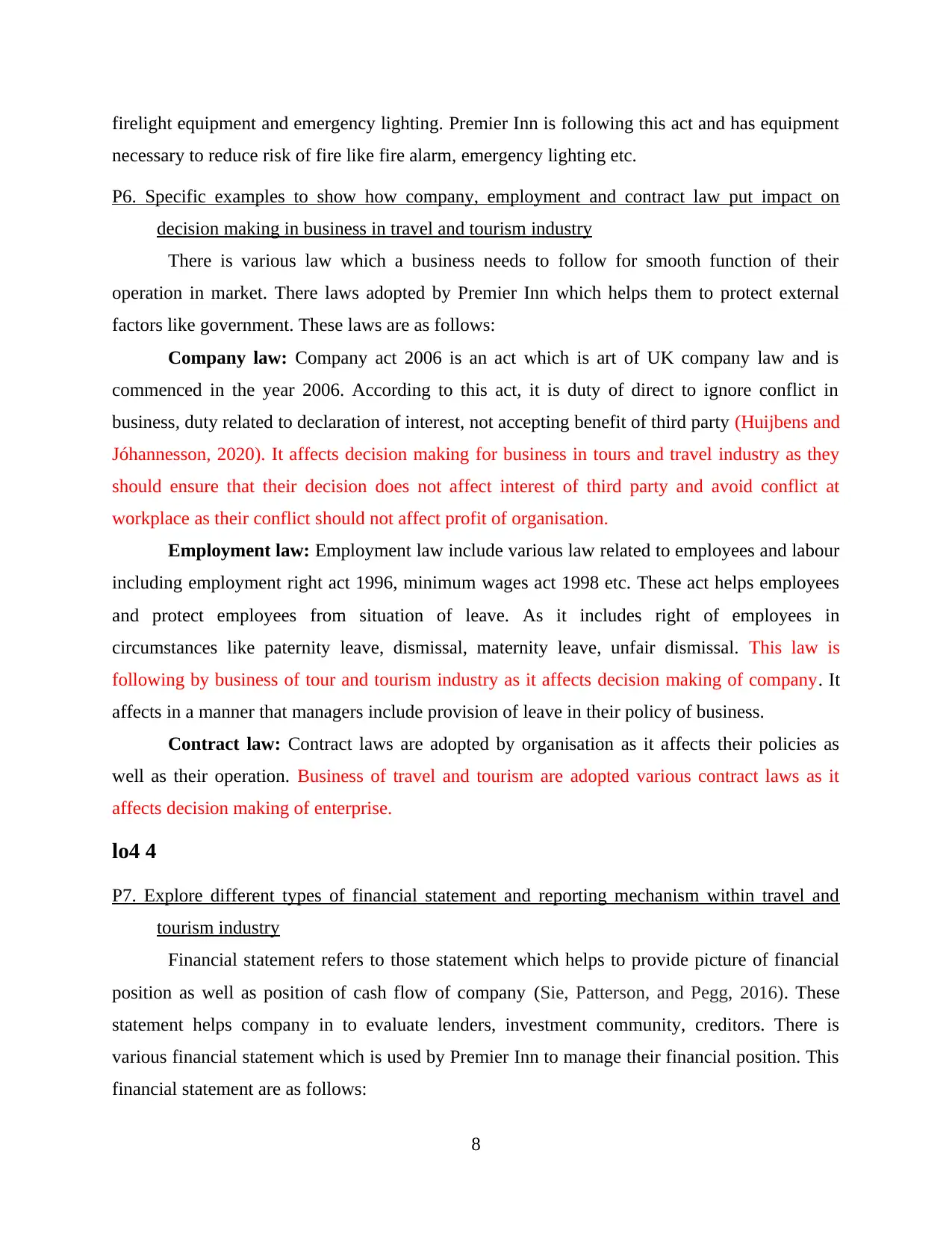
firelight equipment and emergency lighting. Premier Inn is following this act and has equipment
necessary to reduce risk of fire like fire alarm, emergency lighting etc.
P6. Specific examples to show how company, employment and contract law put impact on
decision making in business in travel and tourism industry
There is various law which a business needs to follow for smooth function of their
operation in market. There laws adopted by Premier Inn which helps them to protect external
factors like government. These laws are as follows:
Company law: Company act 2006 is an act which is art of UK company law and is
commenced in the year 2006. According to this act, it is duty of direct to ignore conflict in
business, duty related to declaration of interest, not accepting benefit of third party (Huijbens and
Jóhannesson, 2020). It affects decision making for business in tours and travel industry as they
should ensure that their decision does not affect interest of third party and avoid conflict at
workplace as their conflict should not affect profit of organisation.
Employment law: Employment law include various law related to employees and labour
including employment right act 1996, minimum wages act 1998 etc. These act helps employees
and protect employees from situation of leave. As it includes right of employees in
circumstances like paternity leave, dismissal, maternity leave, unfair dismissal. This law is
following by business of tour and tourism industry as it affects decision making of company. It
affects in a manner that managers include provision of leave in their policy of business.
Contract law: Contract laws are adopted by organisation as it affects their policies as
well as their operation. Business of travel and tourism are adopted various contract laws as it
affects decision making of enterprise.
lo4 4
P7. Explore different types of financial statement and reporting mechanism within travel and
tourism industry
Financial statement refers to those statement which helps to provide picture of financial
position as well as position of cash flow of company (Sie, Patterson, and Pegg, 2016). These
statement helps company in to evaluate lenders, investment community, creditors. There is
various financial statement which is used by Premier Inn to manage their financial position. This
financial statement are as follows:
8
necessary to reduce risk of fire like fire alarm, emergency lighting etc.
P6. Specific examples to show how company, employment and contract law put impact on
decision making in business in travel and tourism industry
There is various law which a business needs to follow for smooth function of their
operation in market. There laws adopted by Premier Inn which helps them to protect external
factors like government. These laws are as follows:
Company law: Company act 2006 is an act which is art of UK company law and is
commenced in the year 2006. According to this act, it is duty of direct to ignore conflict in
business, duty related to declaration of interest, not accepting benefit of third party (Huijbens and
Jóhannesson, 2020). It affects decision making for business in tours and travel industry as they
should ensure that their decision does not affect interest of third party and avoid conflict at
workplace as their conflict should not affect profit of organisation.
Employment law: Employment law include various law related to employees and labour
including employment right act 1996, minimum wages act 1998 etc. These act helps employees
and protect employees from situation of leave. As it includes right of employees in
circumstances like paternity leave, dismissal, maternity leave, unfair dismissal. This law is
following by business of tour and tourism industry as it affects decision making of company. It
affects in a manner that managers include provision of leave in their policy of business.
Contract law: Contract laws are adopted by organisation as it affects their policies as
well as their operation. Business of travel and tourism are adopted various contract laws as it
affects decision making of enterprise.
lo4 4
P7. Explore different types of financial statement and reporting mechanism within travel and
tourism industry
Financial statement refers to those statement which helps to provide picture of financial
position as well as position of cash flow of company (Sie, Patterson, and Pegg, 2016). These
statement helps company in to evaluate lenders, investment community, creditors. There is
various financial statement which is used by Premier Inn to manage their financial position. This
financial statement are as follows:
8
Paraphrase This Document
Need a fresh take? Get an instant paraphrase of this document with our AI Paraphraser
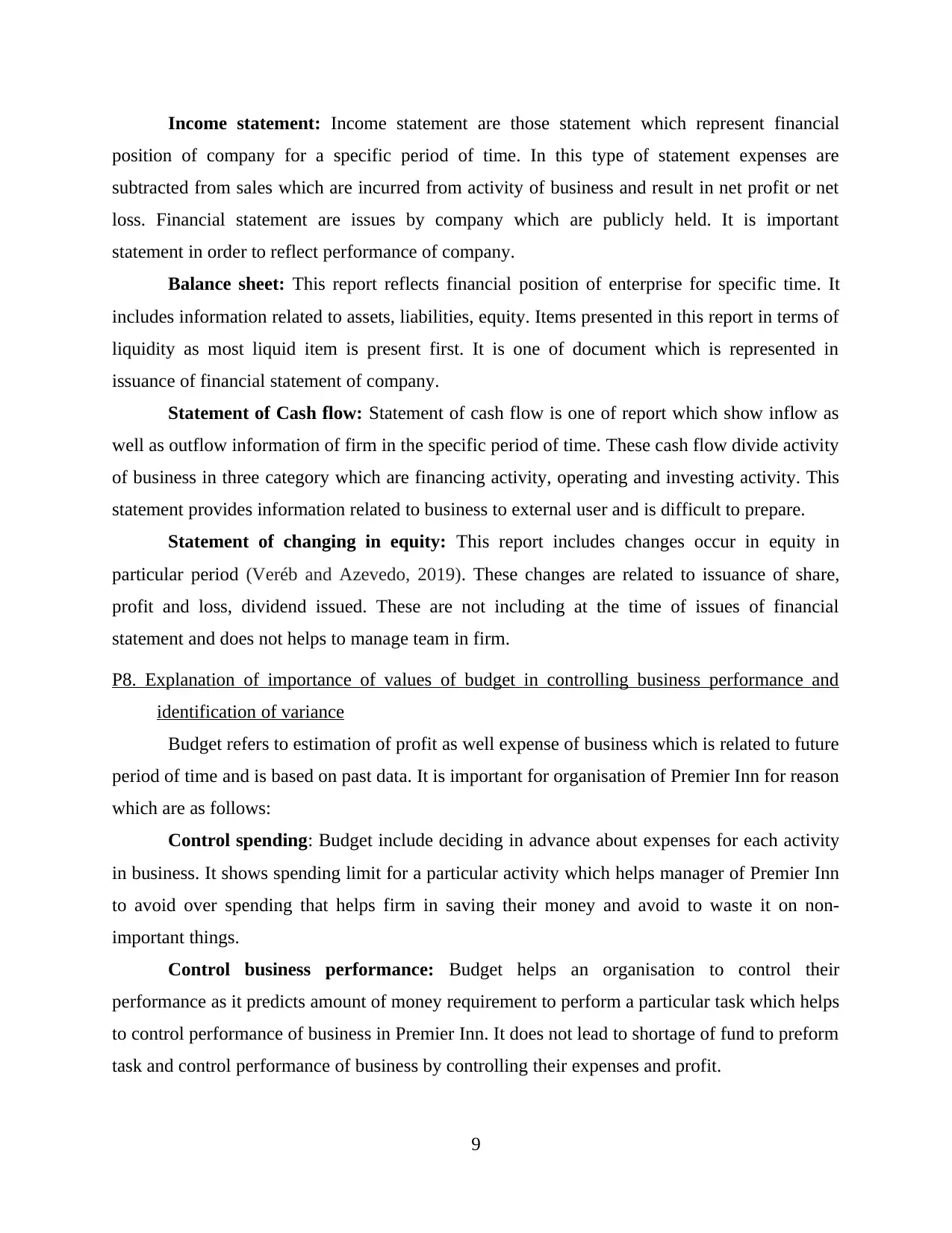
Income statement: Income statement are those statement which represent financial
position of company for a specific period of time. In this type of statement expenses are
subtracted from sales which are incurred from activity of business and result in net profit or net
loss. Financial statement are issues by company which are publicly held. It is important
statement in order to reflect performance of company.
Balance sheet: This report reflects financial position of enterprise for specific time. It
includes information related to assets, liabilities, equity. Items presented in this report in terms of
liquidity as most liquid item is present first. It is one of document which is represented in
issuance of financial statement of company.
Statement of Cash flow: Statement of cash flow is one of report which show inflow as
well as outflow information of firm in the specific period of time. These cash flow divide activity
of business in three category which are financing activity, operating and investing activity. This
statement provides information related to business to external user and is difficult to prepare.
Statement of changing in equity: This report includes changes occur in equity in
particular period (Veréb and Azevedo, 2019). These changes are related to issuance of share,
profit and loss, dividend issued. These are not including at the time of issues of financial
statement and does not helps to manage team in firm.
P8. Explanation of importance of values of budget in controlling business performance and
identification of variance
Budget refers to estimation of profit as well expense of business which is related to future
period of time and is based on past data. It is important for organisation of Premier Inn for reason
which are as follows:
Control spending: Budget include deciding in advance about expenses for each activity
in business. It shows spending limit for a particular activity which helps manager of Premier Inn
to avoid over spending that helps firm in saving their money and avoid to waste it on non-
important things.
Control business performance: Budget helps an organisation to control their
performance as it predicts amount of money requirement to perform a particular task which helps
to control performance of business in Premier Inn. It does not lead to shortage of fund to preform
task and control performance of business by controlling their expenses and profit.
9
position of company for a specific period of time. In this type of statement expenses are
subtracted from sales which are incurred from activity of business and result in net profit or net
loss. Financial statement are issues by company which are publicly held. It is important
statement in order to reflect performance of company.
Balance sheet: This report reflects financial position of enterprise for specific time. It
includes information related to assets, liabilities, equity. Items presented in this report in terms of
liquidity as most liquid item is present first. It is one of document which is represented in
issuance of financial statement of company.
Statement of Cash flow: Statement of cash flow is one of report which show inflow as
well as outflow information of firm in the specific period of time. These cash flow divide activity
of business in three category which are financing activity, operating and investing activity. This
statement provides information related to business to external user and is difficult to prepare.
Statement of changing in equity: This report includes changes occur in equity in
particular period (Veréb and Azevedo, 2019). These changes are related to issuance of share,
profit and loss, dividend issued. These are not including at the time of issues of financial
statement and does not helps to manage team in firm.
P8. Explanation of importance of values of budget in controlling business performance and
identification of variance
Budget refers to estimation of profit as well expense of business which is related to future
period of time and is based on past data. It is important for organisation of Premier Inn for reason
which are as follows:
Control spending: Budget include deciding in advance about expenses for each activity
in business. It shows spending limit for a particular activity which helps manager of Premier Inn
to avoid over spending that helps firm in saving their money and avoid to waste it on non-
important things.
Control business performance: Budget helps an organisation to control their
performance as it predicts amount of money requirement to perform a particular task which helps
to control performance of business in Premier Inn. It does not lead to shortage of fund to preform
task and control performance of business by controlling their expenses and profit.
9
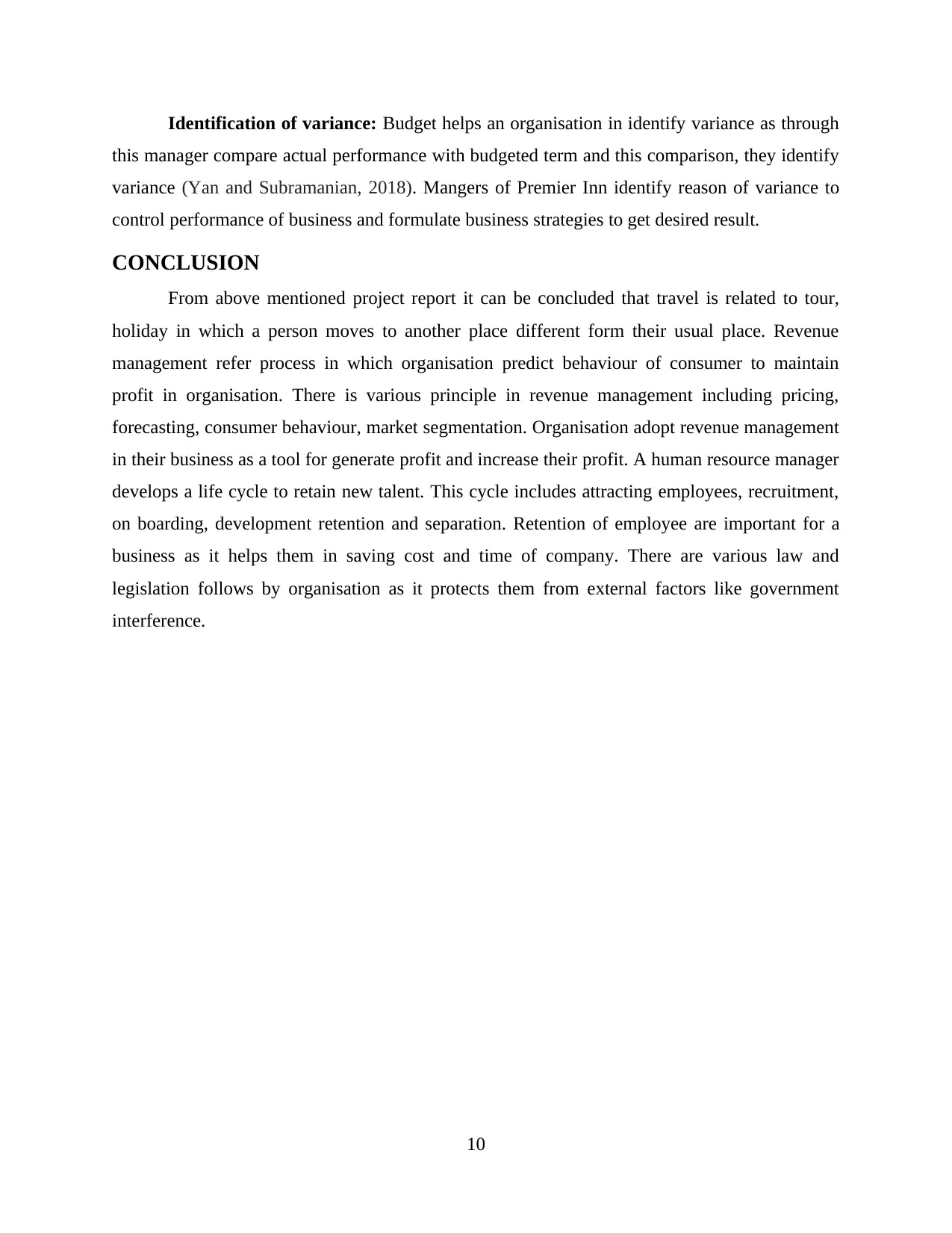
Identification of variance: Budget helps an organisation in identify variance as through
this manager compare actual performance with budgeted term and this comparison, they identify
variance (Yan and Subramanian, 2018). Mangers of Premier Inn identify reason of variance to
control performance of business and formulate business strategies to get desired result.
CONCLUSION
From above mentioned project report it can be concluded that travel is related to tour,
holiday in which a person moves to another place different form their usual place. Revenue
management refer process in which organisation predict behaviour of consumer to maintain
profit in organisation. There is various principle in revenue management including pricing,
forecasting, consumer behaviour, market segmentation. Organisation adopt revenue management
in their business as a tool for generate profit and increase their profit. A human resource manager
develops a life cycle to retain new talent. This cycle includes attracting employees, recruitment,
on boarding, development retention and separation. Retention of employee are important for a
business as it helps them in saving cost and time of company. There are various law and
legislation follows by organisation as it protects them from external factors like government
interference.
10
this manager compare actual performance with budgeted term and this comparison, they identify
variance (Yan and Subramanian, 2018). Mangers of Premier Inn identify reason of variance to
control performance of business and formulate business strategies to get desired result.
CONCLUSION
From above mentioned project report it can be concluded that travel is related to tour,
holiday in which a person moves to another place different form their usual place. Revenue
management refer process in which organisation predict behaviour of consumer to maintain
profit in organisation. There is various principle in revenue management including pricing,
forecasting, consumer behaviour, market segmentation. Organisation adopt revenue management
in their business as a tool for generate profit and increase their profit. A human resource manager
develops a life cycle to retain new talent. This cycle includes attracting employees, recruitment,
on boarding, development retention and separation. Retention of employee are important for a
business as it helps them in saving cost and time of company. There are various law and
legislation follows by organisation as it protects them from external factors like government
interference.
10
⊘ This is a preview!⊘
Do you want full access?
Subscribe today to unlock all pages.

Trusted by 1+ million students worldwide
1 out of 15
Related Documents
Your All-in-One AI-Powered Toolkit for Academic Success.
+13062052269
info@desklib.com
Available 24*7 on WhatsApp / Email
![[object Object]](/_next/static/media/star-bottom.7253800d.svg)
Unlock your academic potential
Copyright © 2020–2026 A2Z Services. All Rights Reserved. Developed and managed by ZUCOL.



